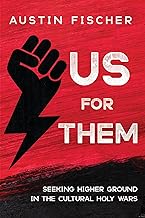Us for Them: Book Discussion: Chapter 1
Here I begin a series of comments on Austin Fischer’s new book Us for Them: Seeking Higher Ground in the Cultural Holy Wars (Wipf & Stock, 2024). The chapter is titled Justice + Friendship. I invite those who have read the chapter to participate in discussion (following the rules below). Others may ask questions.
Austin is my friend and former student. I am very proud of him which doesn’t mean we agree about everything. While he does not have a PhD he is a brilliant Christian and very effective church leader. (I have told him I don’t think he needs a doctoral degree because he’s already smarter and more knowledgeable than many “doctors” I know!) I am proud to call him my friend.
When I read a chapter I try to find one paragraph that expresses the main point. There are many good points in this chapter, but here is one paragraph that stands out to me as especially expressing the chapter’s thesis:
”What we must be ultimately committed to is not victory—what we must be ultimately committed to is each other. For only if our commitment to each other is more ultimate than our commitment to victory will we ceaselessly pursue a justice that is sustainable because sustained by the contemplative capacity to make room for the other that we might, more simply, call friendship.” (15)
So who does Austin mean by “we?” He means the church, but also, perhaps Americans. But his focus is Christians in churches that are pluralistic with regard to political commitments. He writes this book into the so-called “culture wars” that have invaded the churches.
Austin’s ideas are his own, but he clearly is influenced, at least on this subject, by theologians like Miroslav Volf, Wendell Barry, Gustavo Gutierrez, and Jesus! Austin is widely read and knows the thoughts of these and many more Christian (and other) thinkers.
So now I want to offer a question to Austin and you, my fellow readers. I expect that Austin will answer it, implicitly if not explicitly, in later chapters. (Yes, I’ve read the whole book, but here, as we go through it together, I am going to pretend this is my first reading.)
I can easily agree that we should and can be friends with fellow Christians whose views on politics, widely regarded, are at variance with our own. I have friends whose views are very different from my own. However, especially in the last few years, I have experienced some friends insulting me for not agreeing with them or for being, in their “eyes,” ignorant, brainwashed, leftist, anti-American, etc. And I know fellow Christians who believe, for example, that Israel SHOULD commit genocide against the Palestinians. And that’s just one example of something I find so repugnant that I don’t know what to do with it.
Let’s go back in mind and time to Germany in the 1930s. In that time and place there were Christians who hailed the Nazi Party and Hitler as a new revelation of God and stood by them and him even as thousands of Jews were taken away to who knew where. Some of them DID know where. There came a point where dialogue between members of the Confessing Church and members of the German Christians (a specific network of Nazi “Christians”) broke off. They could no longer be friends.
My question to Austin (and you) is Are there limits to friendship, even among Christians? What if a fellow believer, a church member, a confessing Christian is an avowed racist? Austin says “we must distance ourselves from our political commitments.” (15) Yes, I agree. But can we distance ourselves from our commitments to be AGAINST some ideologies and attitudes—to the point that we cannot be friends with people who hold them firmly? Can I be a friend of a white supremacist? That’s especially difficult for me as I have very close loved ones who are black.
Austin writes as a pastor—into a church situation where there are dear members who hold extremely different political and social views. But I wonder if he could bring himself to be friends with (and I don’t mean just friendly to) white supremacists? He would be a bigger man than I am if so. Or maybe I shouldn’t be a “friend” of a white supremacist. If you’re truly a friend of someone, doesn’t that imply that you think his or her basic beliefs and commitments are NOT pernicious, dangerous, evil? Can you, can I, be a companion with evil? I’m not talking about being KIND to someone; I’m talking about entering into or sustaining a friendship with someone who believes that evil is good.
Tell me what you think. And any other responses or reactions to this chapter.
I will take up Chapter 2 in about a week.
*Note: If you read this chapter, feel free to comment. If you did not read it, fell free to ask a question. In any case, keep your comment or question(s) relatively brief (no more than 100 words), on topic, addressed to me, civil and respectful (not hostile or argumentative), and devoid of pictures or links.*














